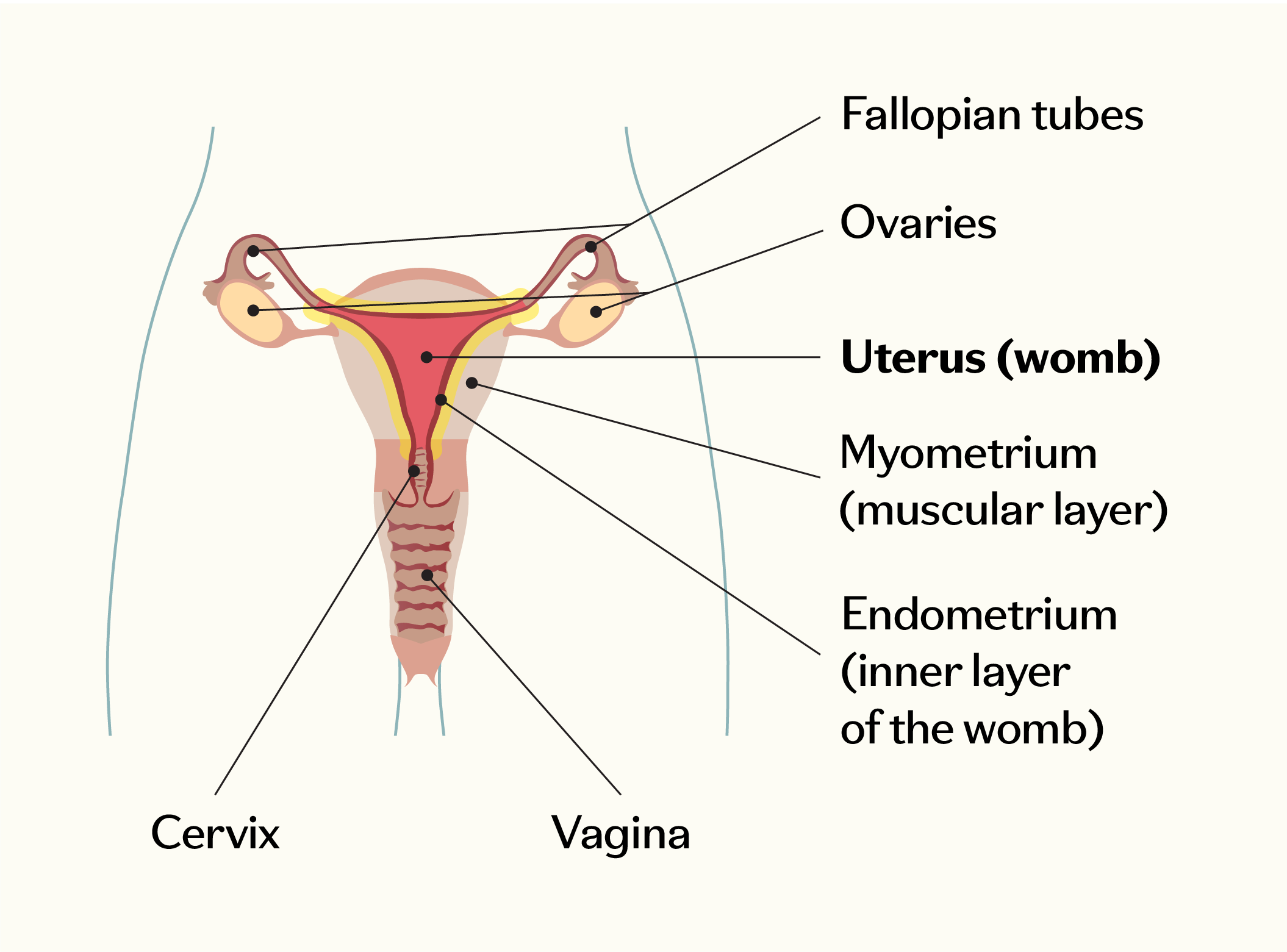The uterus
Also known as the womb, the uterus is a part of the body that sits low in the pelvis (between the hips). It is where a baby sits during pregnancy.1

How uterine cancer starts
Uterine cancer develops when the cells in the uterus begin to grow and divide in an uncontrolled way, creating a tumour. It is also called womb cancer.1,2
Uterine cancer can affect anyone with a uterus. This includes women, some non-binary people, some transgender men, and some intersex people.3
In the UK, there are almost 10,000 cases of uterine cancer every year.4 Certain factors, including having a high level of a hormone called oestrogen, can increase someone’s risk of getting uterine cancer. However, often, the cause of uterine cancer is unknown.5,6
*Estimate based on the average number of people diagnosed with uterine cancer in the UK each year between 2017 and 2019.
Types of uterine cancer
The type of uterine cancer depends on where the cancer started in the uterus. The main types of uterine cancer are described below.7
Starts in the inner layer of the uterus. It is the most common type of uterine cancer. About 9 in every 10 cases (about 90%) of uterine cancer are this type.8,9
These are less common types of uterine cancer. Taken together, less than 1 in every 10 cases (less than 10%) of uterine cancer are this type.8,9
Treatment options for uterine cancer
The exact treatment given to someone with uterine cancer depends on a few things. These include which type of cancer it is, where in the uterus it is, and what stage it is (meaning how big it is and whether it has spread outside of the uterus).10,11
Common treatments for uterine cancer include:10
- Surgery: This is usually the main treatment for uterine cancer. It may involve taking out the uterus and some parts of the body around it
- Radiotherapy: This aims high-energy rays at the cancer cells. It may be given to people who can’t have surgery or who have large tumours, or it can be used after surgery to lower the chance of the cancer coming back.
- Chemotherapy: These medicines kill cancer cells. They are sometimes used together with radiotherapy, or used to slow down the growth of the cancer and help with symptoms.
- Hormone therapy: This might be used if someone isn’t well enough for surgery or chemotherapy.
- Immunotherapy: People with advanced cancer might have immunotherapy. It works by encouraging the immune system to fight the cancer.
Remember, your healthcare team is there to support you and help you find the treatment that best suits you and your situation. You are not alone on this journey.

If you or someone you know has been diagnosed with cancer, support groups and charities are great places to find information and connect with people going through a similar experience.

Life with cancer is different for everyone. So, if you need support, it should be personal to you. ByYourSide has been created by Pfizer to offer you practical support and guidance to help you manage life with cancer in a way that is best for you.
References
- Macmillan. Womb cancer. Available from: https://www.macmillan.org.uk/cancer-information-and-support/womb-cancer [Accessed May 2025].
- Cleveland Clinic. Uterine cancer (endometrial cancer). Available from: https://my.clevelandclinic.org/health/diseases/16409-uterine-cancer [Accessed May 2025].
- NHS 111 Wales. Cancer of the uterus (womb). Available from: https://111.wales.nhs.uk/canceroftheuterus(womb)/?locale=en [Accessed May 2025].
- Cancer Research UK. Uterine cancer statistics. Available from: https://www.cancerresearchuk.org/health-professional/cancer-statistics/statistics-by-cancer-type/uterine-cancer [Accessed May 2025].
- National Health Service. Womb (uterus) cancer. Causes. Available from: https://www.nhs.uk/conditions/womb-cancer/causes/ [Accessed May 2025].
- Cancer Council Victoria. Cancer of the uterus. Available from: https://www.cancervic.org.au/cancer-information/types-of-cancer/uterine_cancer/uterine-cancer-overview.html [Accessed May 2025].
- Cancer Treatment Centers of America. Uterine cancer types. Available from: https://www.cancercenter.com/cancer-types/uterine-cancer/types [Accessed May 2025].
- Bupa. Womb cancer. Available from: https://www.bupa.co.uk/health-information/cancer/womb-cancer [Accessed May 2025].
- GPnotebook. Endometrial cancer. Available from: https://gpnotebook.com/en-GB/pages/gynaecology/endometrial-carcinoma [Accessed May 2025].
- National Health Service. Womb (uterus) cancer. Treatment. Available from: https://www.nhs.uk/conditions/womb-cancer/treatment/ [Accessed May 2025].
- Cancer Research UK. Womb cancer treatment options. Available from: https://www.cancerresearchuk.org/about-cancer/womb-cancer/treatment/decisions-about-treatment [Accessed May 2025].
